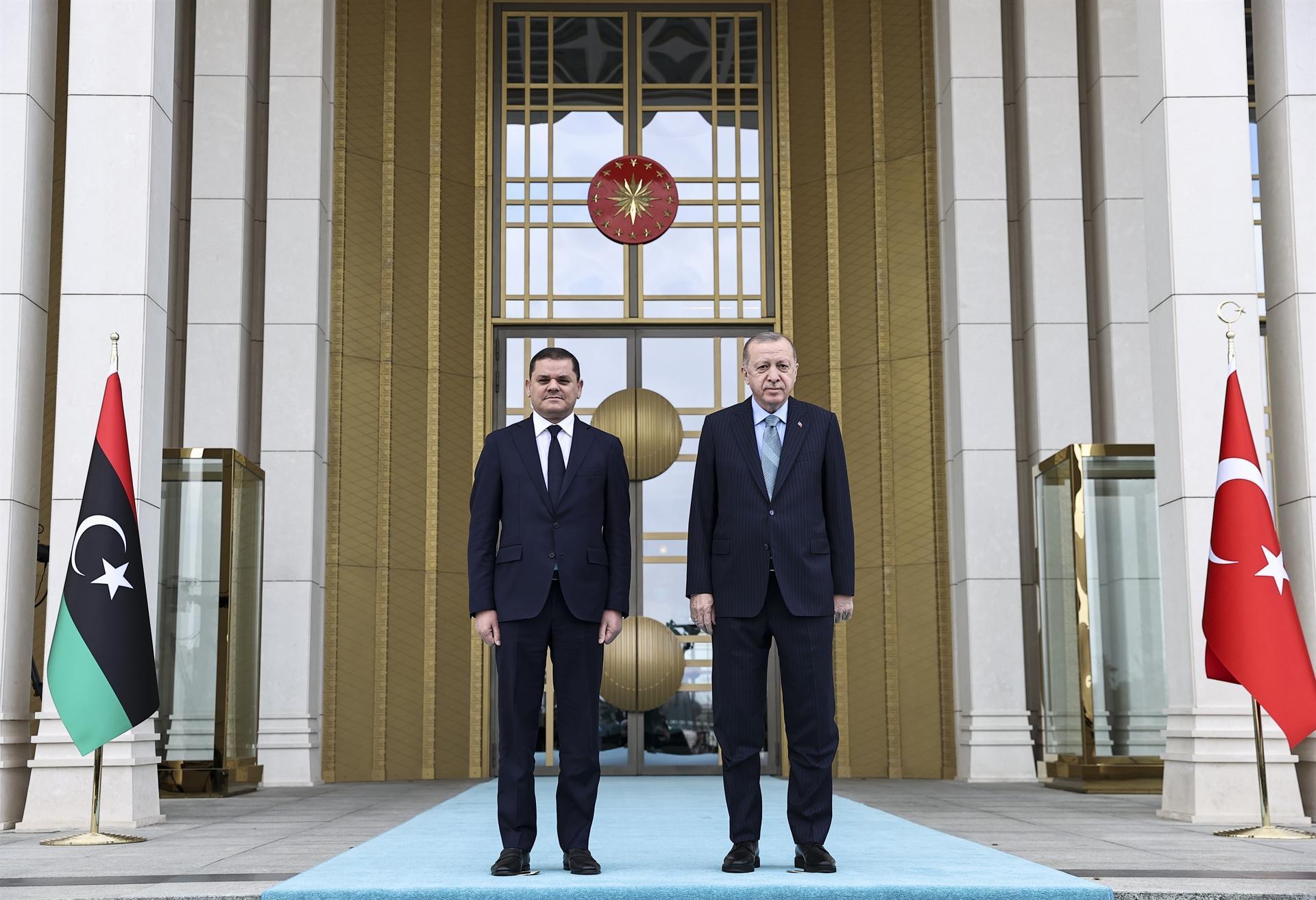New Libyan unity government pays first visit to Turkey
ANKARA

Libyan Prime Minister Abdul Hamid Mohammed Dbeibah and a delegation of ministers made their first visit to Turkey on April 12 since taking office last month.
As part of a two-day visit, President Recep Tayyip Erdoğan and Dbeibeh on April 12 chaired the first meeting of the Turkey-Libya High-Level Strategic Cooperation Council in Ankara.
Ahead of the council meeting, Turkish and Libyan ministers had bilateral meetings, while Erdoğan welcomed the Libyan prime minister with an official ceremony and had a tête-à-tête meeting.
At a press conference later, Erdoğan said that Turkey's support for Libya helped prevent the fall of the capital Tripoli as well as more massacres by putschists and helped provide a cease-fire.
"Those who took sides with putschists and the coup in Libya instead of its legitimacy, rights, and justice were allies in the massacres," he said, referring to recent conflict in the country.
Erdoğan said Turkey will continue giving all support to Libya’s Government of National Unity, just as it gave to the previous legitimate government.
"Steps have been taken to accelerate the return of Turkish private sector to Libya," Erdogan said, adding that Turkey will also deliver 150,000 doses of COVID-19 vaccine to Libya on Tuesday.
He stressed that a Turkish-Libyan deal on maritime jurisdictions signed in November 2019 helped secure both countries' national interests.
Erdoğan also urged the international community to give Libya genuine support to hold its elections on Dec. 24, as scheduled.
Joint statement after talks
A joint Turkey-Libya statement released after bilateral meetings affirmed the importance of preserving sovereignty, independence, territorial integrity and political unity throughout Libya.
The statement said Libya’s only legitimate leadership structures are the Presidential Council and Government of National Unity chosen by elections.
The statement also declared Libya’s coordinated determination to carry out a political process leading to elections on Dec. 24, as scheduled.
The joint statement stressed the importance of Turkey's contributions to establishing and maintaining a permanent and sustainable cease-fire in Libya.
The statement also stressed the importance of holding a regional conference to support dialogue and cooperation in the Eastern Mediterranean to guarantee parties' rights.
After meeting his Libyan counterpart, Energy and Natural Resources Minister Fatih Dönmez tweeted that they decided to develop cooperation with Libya, especially oil and natural gas.
Environment and Urban Planning Minister Murat Kurum stated that they met with Libyan Minister of Housing and Development Abubekir Muhammed El-Gawi. They discussed improving relations between countries and increasing solidarity in the fields of environment and urbanism, he said.
“Turkey and our powerful institutions, including the Presidency of TOKİ [Turkey’s government-backed housing agency], we are willing to make the necessary investments with our private sector in the process of the reconstruction of Libya,” he tweeted.
Foreign Minister Mevlüt Çavuşoğlu met with the Libyan National Unity Government Foreign Minister Najla el-Mengush, Çavuşoğlu tweeted and said they stressed their common determination to strengthen the friendship and cooperation of Turkey and Libya.
“We will continue to support brother Libya in this historical process,” Çavuşoğlu stated.
“Turkey, with all its resources, will continue to stand with Libya’s economic development efforts,” Trade Minister Ruhsar Pekcan said after meeting with the Libyan economy and trade minister and Libya’s planning minister.
In 2013 the trade volume between Turkey and Libya was $3.6 billion, she recalled and said they were pleased to see that it has reached the level of $3.6 billion again as of 2020.
Treasury and Finance Minister Lütfi Elvan also met with the Libyan Finance Minister Khalid Al-Mabrouk Abdullah.
Turkey had backed the Tripoli-based Government of National Accord (GNA) against the eastern-based Libyan National Army (LNA), which was supported by Russia, Egypt, the United Arab Emirates and France.
In 2019, Ankara signed a maritime demarcation agreement with the GNA in the Eastern Mediterranean, and a military cooperation accord under which Turkey sent military advisers and trainers to Tripoli. Ankara also sent military personnel to help the GNA block an LNA offensive on Tripoli last year.
Greece, which opposes the maritime agreement between Tripoli and Ankara, called for the accord to be cancelled last week. Greek Prime Minister Kyriakos Mitsotakis reopened Greece’s embassy in Libya on April 6.
Libya’s new unity government was sworn in on March 15 from two warring sides that had ruled eastern and western regions after completing a smooth transition of power after years of civil war that have engulfed the country since the ouster and killing of strongman Muammar al-Qaddafi in 2011.
Libyan prime minister, selected through a United Nations-led process, has said economic deals between the GNA and Turkey should remain.
















